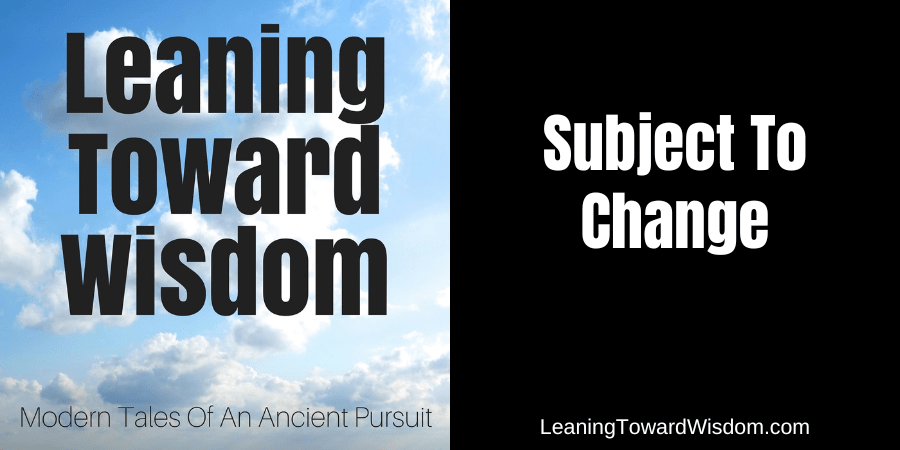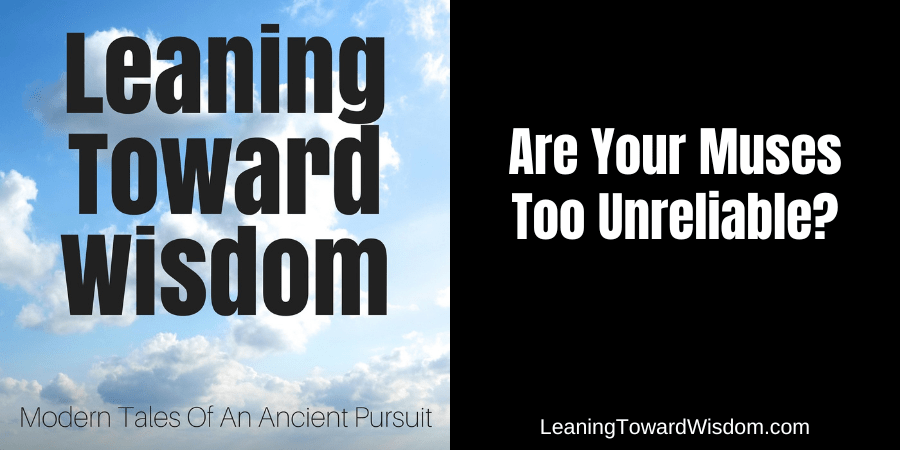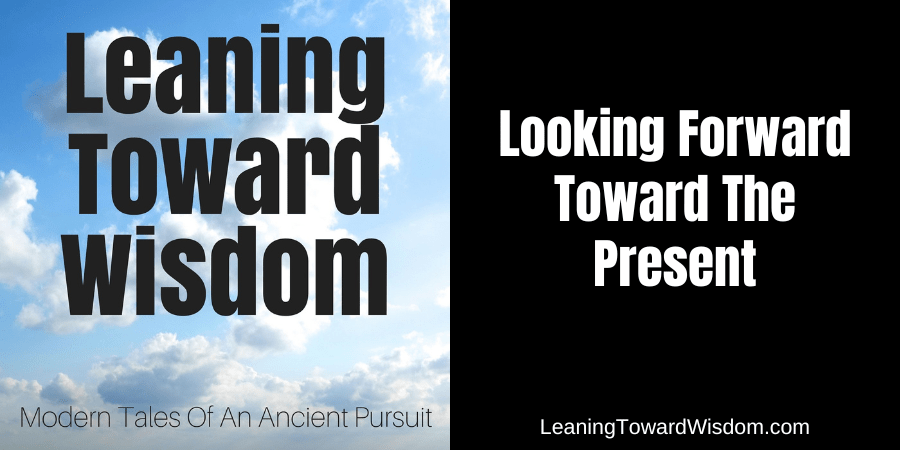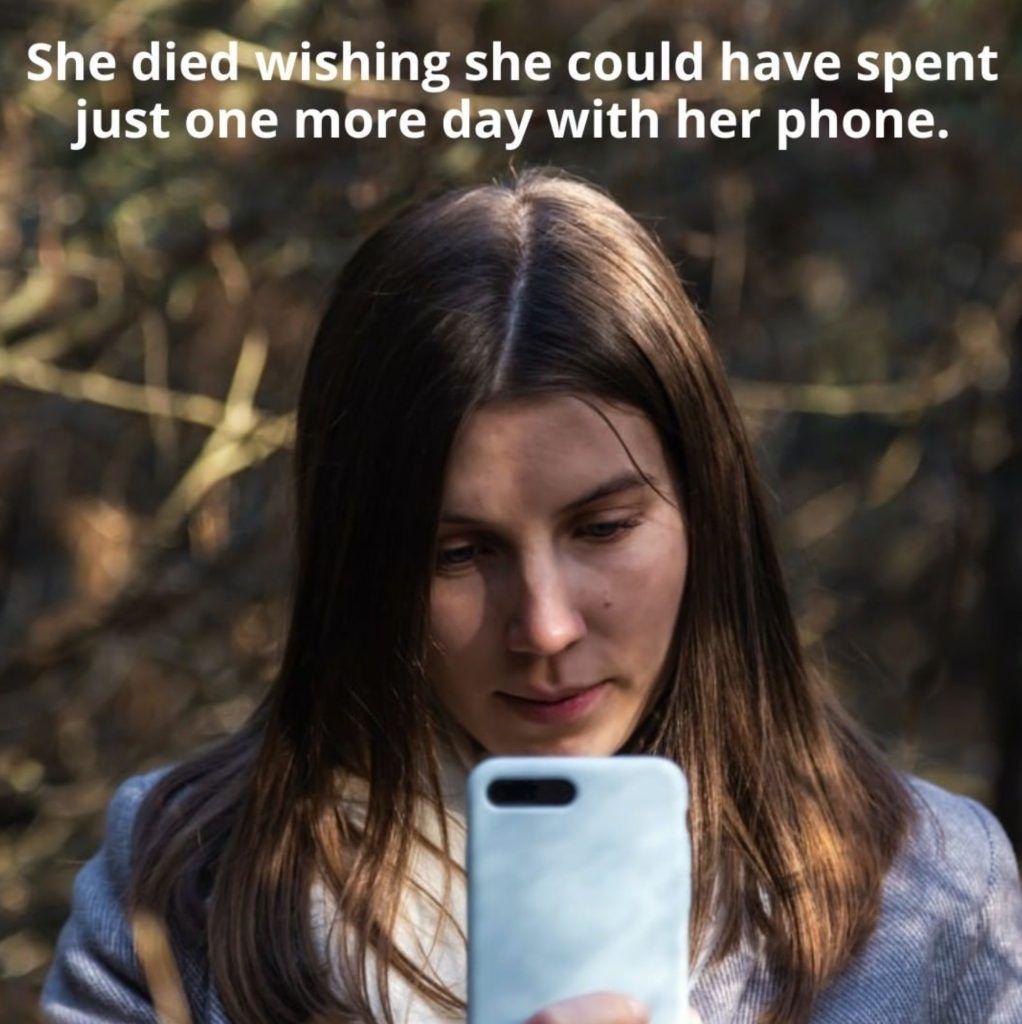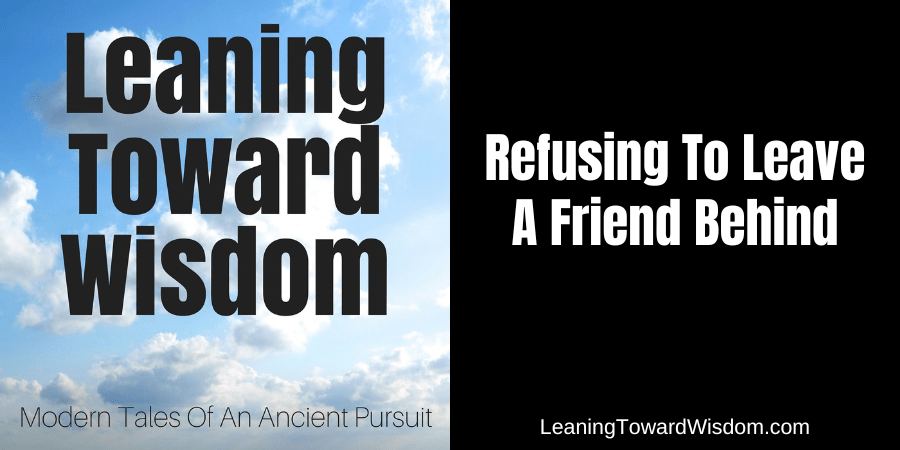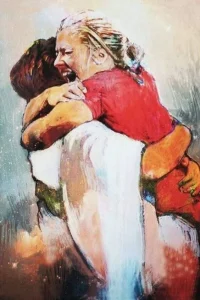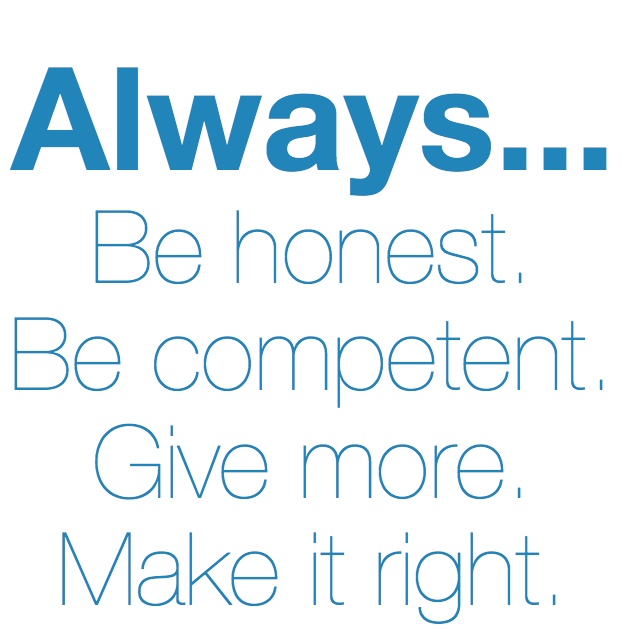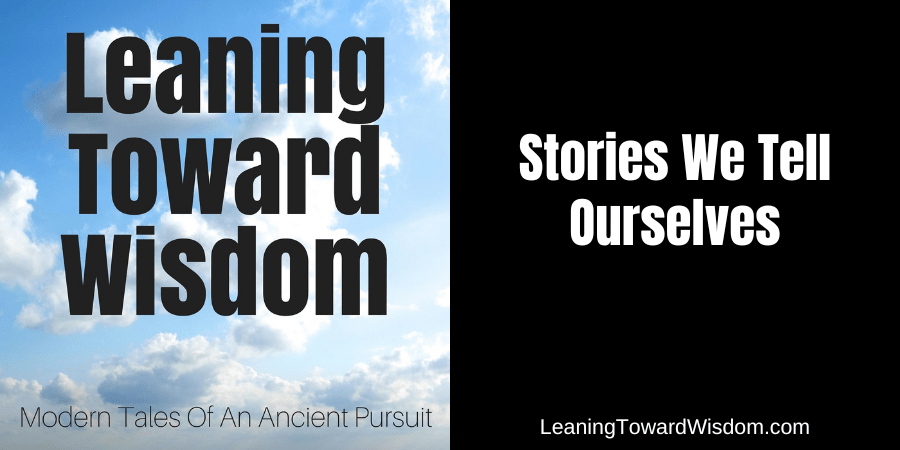Subject To Change
Podcast: Play in new window | Download (Duration: 39:56 — 36.6MB)
Subscribe: Apple Podcasts | Spotify | iHeartRadio | Email | RSS | More
A fanatic is one who can’t change his mind and won’t change the subject.
-Winston Churchill
I must not be a fanatic. 😉
Progress is impossible without change, and those who cannot change their minds cannot change anything.
-George Bernard Shaw
I grew up mostly thinking that change meant the potential for improvement and growth. Sometimes I was disappointed, but not always. Turns out life sometimes disappoints, but not always. So change isn’t that unique.
Some people take a stand against change declaring how much they hate it. They prefer sameness and predictability. It’s comforting.
Then some love change because they’re quickly bored with sameness. They prefer spontaneity, and like things to be more unpredictable.
I don’t feel like I fit into either category because there must be shades of grey between these two extremes. For starters, I rather object to change for the sake of change – except when it comes to moving furniture around. I kinda prefer to have a reason behind the changes I want to make – I want the change at least to have a good shot at being an improvement. I’m more interested in things being better, not just different!
In that regard, everything is subject to change, even if it’s only my ability to understand it more clearly. It doesn’t mean things like absolute facts or truth change, but my view of them certainly can. And sometimes, it should…because sometimes I have things wrong. It’s not the facts or truth that need to change, but ME.
I started pondering how culture increasingly seems fixated on changing everything other than ourselves. When we don’t like something or agree with something, it’s less about us changing our viewpoint or increasing our understanding – but instead, it’s about doing whatever we can to impose altering the externals.
When we are no longer able to change a situation – we are challenged to change ourselves.
-Viktor E. Frankl
The problem is that sometimes the situation isn’t the problem. We are.
For a long time, I’ve been interested in the impact prescription opioids have on the human brain. Young. Old. Men. Women. It doesn’t seem to matter. I’ve talked with older people in their 80s who have a family member (also in their 80s) and they describe the behavior of their loved one exactly the same as those in their 30s describe a much younger man. “They’re behaving like a teenager with a rebellious streak. Selfish. Blaming everybody else.” It doesn’t seem to matter if they’re a young man or an old woman. The opioid user has little or no awareness. It’s just not how they see things. Or themselves.
Rarely have I encountered somebody suffering chronic pain, under the care of a pain management doctor, who found their way out of the opioid abyss, but once in a while, I run into them. Their story is also universal. “I can’t believe that was me,” they’ll say. They rehearse all the awful things they did, all the damage their addiction caused, and with guilt written all over their face, they’ll remark how unbelievable it is that they couldn’t see themselves as they truly were.
It was everybody else. It wasn’t them.
Culture and society make that same declaration every single day. I grew up hearing about “Johnny” and how everybody is out of step except “Johnny.” Truth is, Johnny is the problem, not everybody else. But like the emperor with no clothes, Johnny has no clue.
—————————————–
The Emperor’s New Clothes by Hans Christian Andersen
Many years ago there was an Emperor so exceedingly fond of new clothes that he spent all his money on being well dressed. He cared nothing about reviewing his soldiers, going to the theatre, or going for a ride in his carriage, except to show off his new clothes. He had a coat for every hour of the day, and instead of saying, as one might, about any other ruler, “The King’s in council,” here they always said. “The Emperor’s in his dressing room.”
In the great city where he lived, life was always gay. Every day many strangers came to town, and among them one day came two swindlers. They let it be known they were weavers, and they said they could weave the most magnificent fabrics imaginable. Not only were their colors and patterns uncommonly fine, but clothes made of this cloth had a wonderful way of becoming invisible to anyone who was unfit for his office, or who was unusually stupid.
“Those would be just the clothes for me,” thought the Emperor. “If I wore them I would be able to discover which men in my empire are unfit for their posts. And I could tell the wise men from the fools. Yes, I certainly must get some of the stuff woven for me right away.” He paid the two swindlers a large sum of money to start work at once.
They set up two looms and pretended to weave, though there was nothing on the looms. All the finest silk and the purest old thread which they demanded went into their traveling bags, while they worked the empty looms far into the night.
“I’d like to know how those weavers are getting on with the cloth,” the Emperor thought, but he felt slightly uncomfortable when he remembered that those who were unfit for their position would not be able to see the fabric. It couldn’t have been that he doubted himself, yet he thought he’d rather send someone else to see how things were going. The whole town knew about the cloth’s peculiar power, and all were impatient to find out how stupid their neighbors were.
“I’ll send my honest old minister to the weavers,” the Emperor decided. “He’ll be the best one to tell me how the material looks, for he’s a sensible man and no one does his duty better.”
So the honest old minister went to the room where the two swindlers sat working away at their empty looms.
“Heaven help me,” he thought as his eyes flew wide open, “I can’t see anything at all”. But he did not say so.
Both the swindlers begged him to be so kind as to come near to approve the excellent pattern, the beautiful colors. They pointed to the empty looms, and the poor old minister stared as hard as he dared. He couldn’t see anything, because there was nothing to see. “Heaven have mercy,” he thought. “Can it be that I’m a fool? I’d have never guessed it, and not a soul must know. Am I unfit to be the minister? It would never do to let on that I can’t see the cloth.”
“Don’t hesitate to tell us what you think of it,” said one of the weavers.
“Oh, it’s beautiful -it’s enchanting.” The old minister peered through his spectacles. “Such a pattern, what colors!” I’ll be sure to tell the Emperor how delighted I am with it.”
“We’re pleased to hear that,” the swindlers said. They proceeded to name all the colors and explain the intricate pattern. The old minister paid the closest attention so that he could tell it all to the Emperor. And so he did.
The swindlers at once asked for more money, more silk and gold thread, to get on with the weaving. But it all went into their pockets. Not a thread went into the looms, though they worked at their weaving as hard as ever.
The Emperor presently sent another trustworthy official to see how the work progressed and how soon it would be ready. The same thing happened to him that had happened to the minister. He looked and he looked, but as there was nothing to see in the looms he couldn’t see anything.
“Isn’t it a beautiful piece of goods?” the swindlers asked him, as they displayed and described their imaginary pattern.
“I know I’m not stupid,” the man thought, “so it must be that I’m unworthy of my good office. That’s strange. I mustn’t let anyone find it out, though.” So he praised the material he did not see. He declared he was delighted with the beautiful colors and the exquisite pattern. To the Emperor, he said, “It held me spellbound.”
All the town was talking of this splendid cloth, and the Emperor wanted to see it for himself while it was still in the looms. Attended by a band of chosen men, among whom were his two old trusted officials-the ones who had been to the weavers-he set out to see the two swindlers. He found them weaving with might and main, but without a thread in their looms.
“Magnificent,” said the two officials already duped. “Just look, Your Majesty, what colors! What a design!” They pointed to the empty looms, each supposing that the others could see the stuff.
“What’s this?” thought the Emperor. “I can’t see anything. This is terrible!
Am I a fool? Am I unfit to be the Emperor? What a thing to happen to me of all people! – Oh! It’s very pretty,” he said. “It has my highest approval.” And he nodded approbation at the empty loom. Nothing could make him say that he couldn’t see anything.
His whole retinue stared and stared. One saw no more than another, but they all joined the Emperor in exclaiming, “Oh! It’s very pretty,” and they advised him to wear clothes made of this wonderful cloth, especially for the great procession he was soon to lead. “Magnificent! Excellent! Unsurpassed!” were bandied from mouth to mouth, and everyone did his best to seem well pleased. The Emperor gave each of the swindlers a cross to wear in his buttonhole, and the title of “Sir Weaver.”
Before the procession the swindlers sat up all night and burned more than six candles, to show how busy they were finishing the Emperor’s new clothes. They pretended to take the cloth off the loom. They made cuts in the air with huge scissors. And at last, they said, “Now the Emperor’s new clothes are ready for him.”
Then the Emperor himself came with his noblest noblemen, and the swindlers each raised an arm as if they were holding something. They said, “These are the trousers, here’s the coat, and this is the mantle,” naming each garment. “All of them are as light as a spider web. One would almost think he had nothing on, but that’s what makes them so fine.”
“Exactly,” all the noblemen agreed, though they could see nothing, for there was nothing to see.
“If Your Imperial Majesty will condescend to take your clothes off,” said the swindlers, “we will help you on with your new ones here in front of the long mirror.”
The Emperor undressed, and the swindlers pretended to put his new clothes on him, one garment after another. They took him around the waist and seemed to be fastening something – that was his train-as the Emperor turned round and round before the looking glass.
“How well Your Majesty’s new clothes look. Aren’t they becoming!” He heard on all sides, “That pattern, so perfect! Those colors, so suitable! It is a magnificent outfit.”
Then the minister of public processions announced: “Your Majesty’s canopy is waiting outside.”
“Well, I’m supposed to be ready,” the Emperor said and turned again for one last look in the mirror. “It is a remarkable fit, isn’t it?” He seemed to regard his costume with the greatest interest.
The noblemen who were to carry his train stooped low and reached for the floor as if they were picking up his mantle. Then they pretended to lift and hold it high. They didn’t dare admit they had nothing to hold.
So off went the Emperor in procession under his splendid canopy. Everyone in the streets and the windows said, “Oh, how fine are the Emperor’s new clothes! Don’t they fit him to perfection? And see his long train!” Nobody would confess that he couldn’t see anything, for that would prove him either unfit for his position, or a fool. No costume the Emperor had worn before was ever such a complete success.
“But he hasn’t got anything on,” a little child said.
“Did you ever hear such innocent prattle?” said its father. And one person whispered to another what the child had said, “He hasn’t anything on. A child says he hasn’t anything on.”
“But he hasn’t got anything on!” the whole town cried out at last.
The Emperor shivered, for he suspected they were right. But he thought, “This procession has got to go on.” So he walked more proudly than ever, as his noblemen held high the train that wasn’t there at all.
—————————————–
Change is the law of life. And those who look only to the past or present are certain to miss the future.
-John F. Kennedy
Lack of self-awareness. Self-deception. Selfishness. These are our enemies that can require the help of others, but only if we’re willing to change ourselves! There’s the rub.
Willingness to change ourselves.
If you’re at the height of your personal growth you can click that STOP button right now. No need to listen any further. Instead, get yourself a microphone and start a podcast to share how you were able to get it done! 😉
Okay, for the rest of us who are still trying our best to figure things out – and aspiring to reach new heights of personal achievement – let’s see if we can wrestle some things to the ground and choke them out. I’m betting we can if we increase our willingness and resolve.
Growth and improvement don’t always mean dramatic alterations. In fact, quite often they’re very subtle, like the extension of an imaginary line altered by a mere few degrees. The further out we extend the line, the wider the gap in where it ends up versus where it was initially headed. So too with our lives when we alter a decision or action by just a little bit.
I’m currently on a trajectory toward this encore phase of life with some very specific outcomes in mind. I’m doing everything in my power to achieve those ideal outcomes. However, I realize things may not line up to allow me that ideal outcome. Does that mean I’m going to stubbornly refuse to change those outcomes? Well, I could, but that’s not how I’m going to roll. I decided long ago that my ideal outcomes are very subject to change. I’ve got an outcome that is supremely ideal – it’s what I would most love to have happen. It’s what I’m working to make happen. But what if time and new information arrive to cause me to question that? What if I change my mind and make a different decision?
This is the big reason why I fixate on the “what’s next?” question. Let’s figure out our next step – just one – then let’s look around and see what we learned in taking that first step. From there we can figure out our next step because it may look different from the second step we initially planned. Or it may not. But there’s little point in making that decision until we must.
Right now, I’m in the throes of the first step. Until I complete that step I’m going to make plans for what I think my second step will be, but this first one is so critical it may alter things. Things are subject to change and the change will translate into what I hope will be increasingly better decisions. That’s kinda the point, right? To keep getting better and to keep making better choices!
“I won’t change for anybody.”
Not even for yourself?
Not even when there’s evidence that as Sheryl Crow sings, “A change would do you good?”
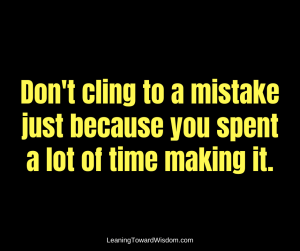
Early in my career, I discovered Herb Cohen, a master negotiator. Herb wrote a book, You Can Negotiate Anything. Part of what I learned by reading Herb was to avoid being fooled into a bad deal simply because you had invested so much time in trying to make a deal. It used to be a common ploy among car dealers. To get shoppers to invest so much time in the dealership trying to buy a car that they’d accept a deal mostly favorable for the dealership. “Man, we’ve been here two hours already, let’s just get this deal done!”
Sometimes we do that to ourselves. We sabotage our own lives by our refusal to change something because we’ve been so committed to it for so long. The more you stop and think about that, the stupider it gets. More time isn’t always the answer any more than hitting it harder is wise advice when armed with a hammer. Sometimes we’re just doing it wrong. Or going about it in a way that’s never going to work.
Subtle changes can include hitting it in a different spot. More substantial changes may be required where we lay down the hammer in lieu of a wrench.
Some behavior is purely wrong. Destructive. Damaging. Moderating abuse isn’t the remedy. Stop it is the better advice. 😀
Vice. Immorality. Sin. Crime. Violence. Abuse.
These behaviors don’t work…even in moderation. Cutting back isn’t the change needed. Elimination is.
Some aspects of life require it IF we’re going to grow. Yes, we’re assuming growth and improvement are the desired outcomes, but that’s not how it is with everybody. Chronic bad behavior seeks no improvement, only approval. Only to be left alone to keep behaving badly. That’s not how we roll here though. We’re leaning toward wisdom, which necessarily means we’re all willing to look into the mirror, no matter how uncomfortable it may be, because we know that’s where our most important changes happen. Within ourselves!
So we’ve talked about changing ourselves. We’ve talked about how our ideal outcomes can change. Before we wrap up, perhaps we ought to give some consideration to things we feel are NOT subject to change. Got anything like that?
What’s in your life that you staunchly refuse to change? Be careful before you answer.
Let me start with God. And faith. God doesn’t change. Jesus doesn’t change. My understanding and obedience are constantly changing though. It’d be easy to convince myself that I need to change God to conform to how I’d like to live, but that’d be impossible in reality even though I could easily deceive myself. God isn’t going to change to my standards. He’s God. I’d better be busy changing to meet His standards.
My wife isn’t going to change. While it’s possible to change a spouse and many people do, that’s impossible for me. Firstly, because of God and my faith. Secondly, because I have no desire to change who I’m married to. It’s a choice. One I happily made decades ago.
My family isn’t going to change. The relationships do because we’re all growing older. The circumstances of our lives are changing. Kids grow up, get married and have kids of their own. The people who once made up my “immediate” family have their own now. They still matter. I still love them and trust they love me, but the relationships have changed into something different, arguably better.
My core values aren’t going to change. They could, but I made up my mind I won’t let them. I’ve no plans to abandon my faith. Or God. Or my wife. Or my family. I’m not able to make that decision for anybody else because maybe like you, I do have family and friends who made different decisions. Decisions to distance from me. Decisions to live deplorable lives. Decisions to seek my approval for things I simply can’t approve of – from them, from myself or from anybody else. This is where things subject to change can get vexing. Things that change for the worse, not because we make the change, but because somebody else does! Now, we’re faced with “what’s next?” Toxic or dangerous people don’t much like it when we make a choice that disapproves of their decision – their change.
So it is with the son who turns to drugs and alcohol but is constantly leaning on family members to get him out of trouble.
So it is with the daughter who turns to immorality and lude behavior but constantly leans on family members with venom about how they’ve wronged her.
So it is with the person who turns to selfish behavior, but is constantly leaning on acquaintances and family for favorable considerations, taking advantage of anybody.
Bad behavior knows no bounds. Good behavior has no limits.
Humans have a great capacity for greatness – either good or bad. We get to decide. We get to choose change. Or not.

Please tell a friend about the podcast!
